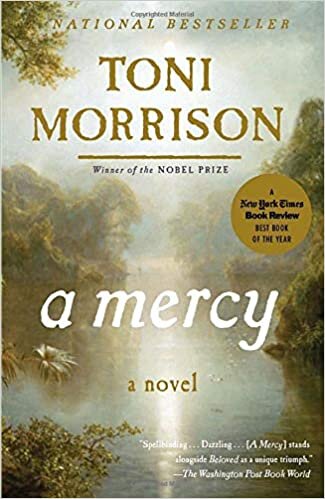A Mercy by Toni Morrison
A Mercy by Toni Morrison
Toni Morrison's exquisite novel A Mercy, marked a departure of sorts for the pre-eminent American author and recipient of the Nobel Prize. Her previous books chronicled Black life from the last decades of slavery up until the era of civil rights. But A Mercy reaches back to the late 1600s, yoking the early years of American slavery together with the decimation of native peoples, the subjugation of women and indentured servitude.
More expansive than Morrison's previous works, A Mercy stretches across the Atlantic to Europe and Africa, retracing the route of the international slave trade. The story begins when Jacob Vaark of New Amsterdam, a trader and farmer, accepts a slave girl as payment for the D'Ortega family's debt. Jacob does not normally "trade in flesh." But the first time he sees the little girl, she makes him laugh, and her mother, sensing his kindness, begs him to take the child away.
The little girl, Florens, joins the Vaark household, which consists of Jacob, his hardworking mail-order wife, her native helpmate and an addled orphan girl named Sorrow. In addition, two indentured men work on the farm. They are a family of abandoned parts, content enough in the world they inhabit.
As the years pass, Jacob grows wealthy from the rum trade. He hires a blacksmith, a free Black man, to help build his dream house. Florens, now a teenager, falls passionately in love, subtly altering the dynamics of the household.
In A Mercy, as with the Pulitzer-prize winning Beloved, Morrison insists that, where circumstances allowed, slaves could make pleasant homes. She celebrates the industriousness of a life drawn from the land, the shared duties and responsibilities that build family and community ties, even across racial lines.
Sometimes Morrison can seem overeager to demonstrate the complexity of slavery. She informs us repeatedly that not all whites are racist -- a truth the reader may surely perceive for herself: Obviously, Jacob and his wife are kinder than the D'Ortegas, who allow a shipload of slaves to drown, then gather up the bodies with pikes and nets. These diabolical scenes are delivered in such calm, reasonable tones, they might be Swiftian satire. But this is Morrison, author of The Black Book, the famous scrapbook of details of slave life. She is nothing if not informed.
Morrison outlines a global economy in which the basic unit is the human being. The name Florens (florins) denotes both a Dutch guilder and a British coin. In the slave economy, Florens possesses merely monetary value: She has no human worth. The novel's central plot traces her perception of herself from a hope-filled individual to abhorred chattel. Her evolution unfolds in stages, through a series of rejections, beginning when her mother gives her away.
A crucial turning point occurs when Florens encounters a group of Puritans who are terrified of her blackness and treat her like an animal. It is at that very moment that something wild inside of her begins to grow. Morrison powerfully demonstrates how race hatred withers the soul.
Morrison has so much to say and says it so well, it is easy to take her sublime style for granted. The quality of writing in this book is simply awe-inspiring. She conjures a virgin landscape so fresh and green and lush the pages of the book feel damp with dew. And her depiction of wildlife! The moose "a proud chieftain;" the sheets of starlings fluttering like leaves from trees; the trees themselves, venerable personages. She conveys a time when there existed between human beings and other living things a recognition and respect. Even so, this glorious land perpetrates myriad cruelties: slavery, sexual oppression, religious intolerance, child abandonment.
In her contrary way, Morrison offers the Atlantic Ocean -- inhabited by the ghosts of drowned slaves -- as a haven and a respite. The addled Sorrow, daughter of a sea captain, knows the tales:
"The thousandfold men walking the waves, singing wordlessly. How their teeth glittered more than the whitecaps under their feet. How, as the sky darkened and the moon rose, the edges of their night-black skin silvered. How the smell of the land ripe and loamy brightened the eyes of the crew but made the sea walkers cry."
From What’s a Black Critic To Do II: Interviews, Profiles and Reviews of Black Writers






